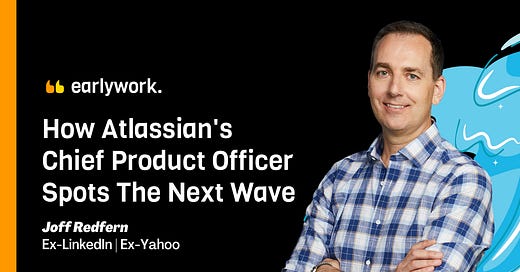🌞 Earlywork #68: How Atlassian's Chief Product Officer Spots The Next Wave
Lessons on predicting the future from Joff Redfern's time leading product at Atlassian, LinkedIn and Yahoo
Ello ello Earlyworkers!
The wave you’re catching today is Earlywork #68, a weekly cheeky newsletter sent every Tuesday that provides free resources + interviews on the careers of tomorrow, for thousands of young Aussies & Kiwis in the tech, startup & social impact landscape.
If you’re not already part of the Earlyverse 🌞🌐, subscribe now to keep a pulse on our latest stories and conversations:
💡Weekly Cheeky Tip
During my time in Atlassian’s APM program, the single most memorable training session I attended was a presentation by Joff Redfern, Atlassian’s first-ever Chief Product Officer.
His core thesis: think about your career in terms of ‘waves’ of innovation 🌊
Joff has built a highly impactful career by riding the internet and mobile waves, including:
Starting the internet group at Fidelity investments in 1995
Being an early employee of a VC-backed startup in 2000, later acquired by a major bank
Serving as VP Product at LinkedIn and Yahoo for a combined 12 years
Founding his own personalised kids gifts startup
Along that journey, his most important piece of career advice comes from his dad, a serial entrepreneur & software engineer at the dawn of the tech industry:
“If you want to be in technology, just stay in front of the wave”
The ‘wave paradigm’ for careers is not something we’re taught to think about by default.
Here are the most important lessons Joff has learned in spotting waves:
Defining a wave
While he was a student, Joff’s dad asked him the following question:
“Technology changes so rapidly, and it’s easy to jump on an elevator going up or down. Which part of the technology market do you want to enter?”
To answer that question, Joff set out reading as much as he could about technology.
One of the most important books he came across was The Structure of Scientific Revolutions by Thomas Kuhn, which talks about the notion of waves in scientific progress.
Joff learned that “In science, there are periods of ‘normal science’ with iterative development, but then periods of ‘revolutionary science’ where a crisis challenges the core thesis and shifts the whole paradigm.”
A classic example that he points to is the Copernican Revolution in the 1500s, whereby “The world went from believing earth was at the centre of the universe, to a heliocentric model, with the Sun at the centre of the solar system.”
That’s not a slow, gradual change towards the truth, but a transformational flip of a core belief that forever changed human society.
So when you think about waves in your career, don’t join a business slightly better than competitors.
Join a business making an uncommon and opinionated bet on a wave. A business that represents a fundamental shift in how society operates.
Successes in spotting waves early
In 1986, the personal computer came out, and Joff’s dad told him it was going to change the world.
That laid an initial foundation for two of the biggest waves Joff would spot in his career:
The Internet Wave 🌐
“The first time I spotted something on my own was in grad school at Cornell. I was working in the computer lab and got exposed to the Internet there.
I thought holy shit, this is going to be huge.
I was approached by the team at Fidelity Investments and decided to help them bridge the gap to the internet,” says Joff of the first big wave he caught.
That first product job at Fidelity’s founding internet group laid the foundation for Joff’s tech career as a product leader at Yahoo, LinkedIn, Atlassian, and several startups.
The Mobile Wave 📱
After his tenure as VP Product at Yahoo, at the time a world-leading internet company, Joff struck his next big wave when joined LinkedIn.
Reflecting on that time, he notes: “The #1 computing paradigm in the world right now is mobile, but prior to the iPhone 2007 launch, mobile was an edgy bet.
I joined LinkedIn as their mobile lead when only 8% of the LinkedIn traffic was mobile.
I said LinkedIn would become a mobile-first company which people laughed at then. 8 years later, 55% of LinkedIn usage was mobile."





